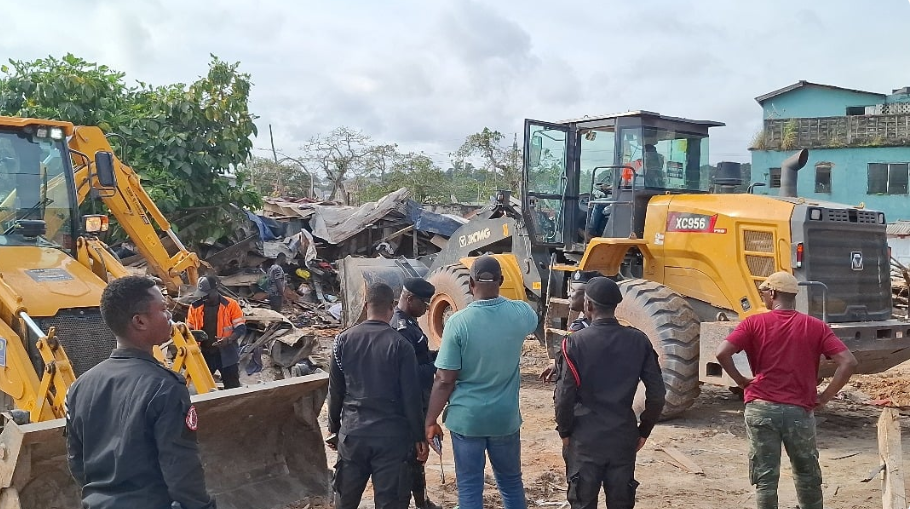The scene of demolition
The Ghana Police Service, the Narcotics Control Commission, and the Sekondi Takoradi Metropolitan Assembly have jointly demolished unauthorized structures at Amanful, a suburb of Takoradi in the Western Region, as part of efforts to pave way for development.
The exercise, which began late Thursday afternoon, targeted illegal extensions and makeshift structures erected on unauthorized spaces, including pavements.
Amanful is among the oldest communities in the Sekondi Takoradi Metropolis, rich in tradition and history. Yet, within this heritage lies a darker side. Main Spain, a section of Amanful, has for years gained notoriety as a hotspot for crime, drug peddling, and theft.
The area has long been labelled a hub for illegal activity, serving as a haven for drug users and dealers trafficking marijuana, cocaine, and other illicit substances.
 Beyond drugs, Main Spain has built a reputation as the go-to destination for stolen goods. Locals often say that if something goes missing in Takoradi, chances are high it will resurface there. Recovering such items, however, usually comes at a cost unless one has strong local ties.
Beyond drugs, Main Spain has built a reputation as the go-to destination for stolen goods. Locals often say that if something goes missing in Takoradi, chances are high it will resurface there. Recovering such items, however, usually comes at a cost unless one has strong local ties.
Despite this notoriety, Main Spain operates by its own unwritten rules. Strangers and outsiders are easy targets, but longtime residents of Amanful are rarely touched. To many of them, Main Spain exists as part of daily life. Its influence has even filtered into music, with musician Kofi Kinaata in his hit ‘Made in Tadi’ referencing the area’s dealings, hinting at how marijuana becomes scarce during Christmas due to demand.
It is against this backdrop that Thursday’s demolition took place. Assistant Commissioner of Police for the Takoradi Division, ACP Jonathan Akweitey Lamptey, explained that the exercise forms part of a broader initiative to clamp down on unlawful settlements and restore order in the municipality.
He added that police personnel would be stationed in the area, with regular patrols intensified to prevent squatters, especially ghetto operators, from re-erecting the structures until planned development projects commence.
Meanwhile, some affected residents expressed frustration over the exercise. They admitted to occupying the land illegally but described the demolition as abrupt and harsh.
“They came this afternoon and asked us to remove all our belongings within 25 to 30 minutes. That is not enough time. Are we not also Ghanaians?” one resident lamented.
A fishmonger who claimed to have lived in the community for more than 30 years also raised concerns.
“Our lights were just put off. I have fish in my fridge and now I’ve been evicted. Where should we go? If it was illegal, why didn’t they evict us years ago?” she asked.
While some residents agreed that removing ghettos was a good move, they appealed that families and legitimate businesses in the area should have been given more time to relocate. They also urged the authorities to assist in finding alternative accommodation and safe spaces.
Main Spain, despite their rich cultural heritage, have for decades been associated with ghettos, makeshift structures, and recurring social challenges issues the latest demolition seeks to address as part of a broader vision for development in the Sekondi Takoradi Metropolis.
Source:Lovinghananews.com


